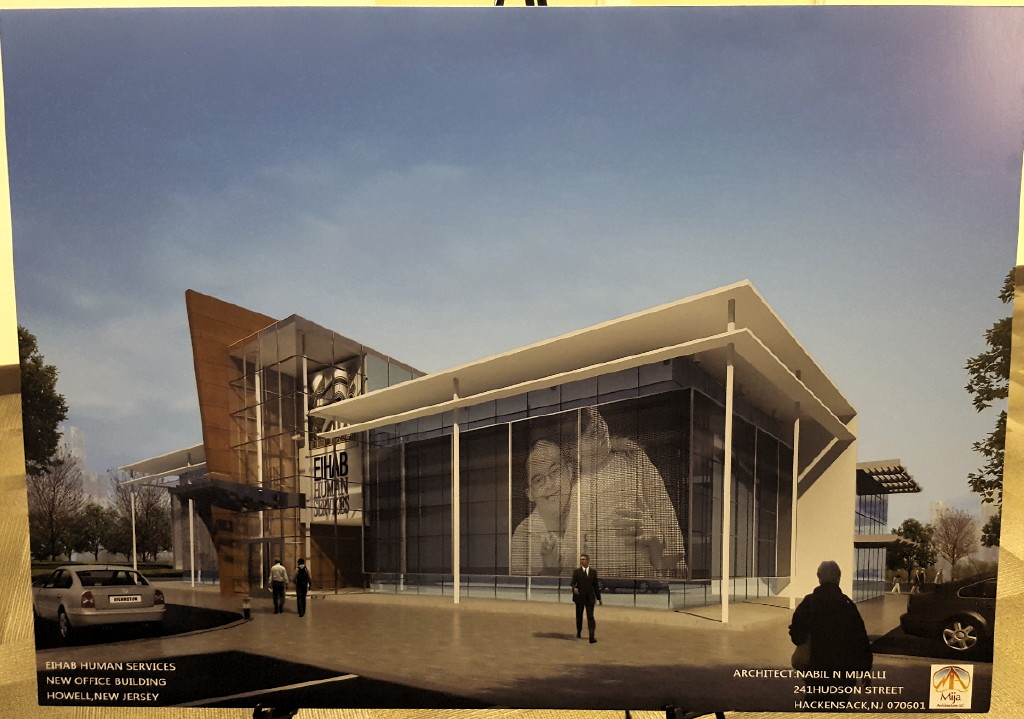HOWELL – Members of the Howell Zoning Board of Adjustment will hear additional testimony on March from an applicant seeking to provide job training skills to and recreational programs for adults who have a developmental disability or a behavioral health challenge.
Eihab Human Services Inc. is seeking a use variance and preliminary and final major site plan approval to construct a building at the corner of Fort Plains and West Farms roads, Howell.
The property is in Howell’s Highway Development 1 zone. The office use the applicant is seeking is permitted in the zone. The proposed use to provide job training skills to and recreational programs for adults who have a developmental disability or a behavioral health challenge is not permitted in the zone.
Attorney Kenneth Pape and Eihab Human Services representative Noreen Sciarretta described the application during the board’s Jan. 28 meeting.
In introducing the application, Pape said, “Eihab Human Services has been part of Howell for seven years. In addition to operating a group home here and dozens of group homes around the state, they have a life skills training facility on Route 9 in a rental property.”
Pape said the applicant’s plan is to bring that training facility to the proposed building.
“In addition, they have administrative offices associated with their company and the administrative offices would on the second floor of the (proposed) building,” he said.
The proposed building would have a gross floor area of 19,965 square feet (9,957 square feet on the first floor and 10,008 square feet on the second floor).
Sciarretta is vice president of the New Jersey division of Eihab Human Services and has been working at the rented space in Howell.
“We are serving adults who are coming to learn community integration skills. Some will work at the site learning skills, others will go out in the community,” she said. “The state is doing a lot of changing right now and they are trying to get as many people as possible placed into these types of organizations so they have the opportunity to get out. As you know, (the state) has closed all of the state institutions at this point.”
Pape told the board members he recently lost his sister, who had a developmental disability.
“These types of facilities were part of my family and for that reason I am comfortable asking certain questions of (Sciarretta) because although I do not have her expertise, I have a lifetime of being familiar with them,” the attorney said.
Sciarretta said socialization skills are taught, as well as arts and crafts so individuals “can learn how to manipulate items so they can work bagging (items) in stores, they can learn how to hang (and) fold clothes, or to work with shopping carts and stock shelves. These are the basic things they would be learning, and there are other activities … we would be teaching people how to tell time, punch a clock and use a computer.”
Pape said some clients would come to the building for part of the day, others might come on certain days, and some would come five days a week.
Sciarretta said a cap of 25 clients would likely be set as the maximum for the building at one time.
Clients who live with their family would be dropped off and picked up by family members, while clients who live in a group home would receive transportation to and from the building, according to the testimony.
The applicant has proposed 50 parking spaces, which includes employee parking and spaces for vans owned by the company. There will be employees to assist the clients and employees working in the administrative offices, according to the testimony.
“A nurse will have an office there … She will go out in the community, she may stop in during the week to maintain her files. Basically the (human resources) department will be there all the time … and a receptionist. I am in and out throughout the week, we have two directors and they are in and out,” Sciarretta said.
The applicant said there would be between 20 and 25 employees.
The zoning board’s chairman, Wendell Nanson, clarified that clients would not be driving to and from the building.
Sciarretta said while some of the individuals who will receive training at the building may have driven at some point in their lives, that is likely no longer the case.
Zoning board member James Moretti asked if family members of the clients would visit the location.
Sciarretta said family members would visit “if they want to observe what is going on, or meet with one of our counselors to talk about specific things they would like to see their son or daughter engage in.”
Pape said this type of facility creates a respite for family members who care for an individual who has a disability.
The applicant’s testimony indicated clients would be at the building from 9 a.m. to 2 p.m. and that employees would work from 9 a.m. to 5 p.m. The application was carried to the zoning board’s March 4 meeting.

